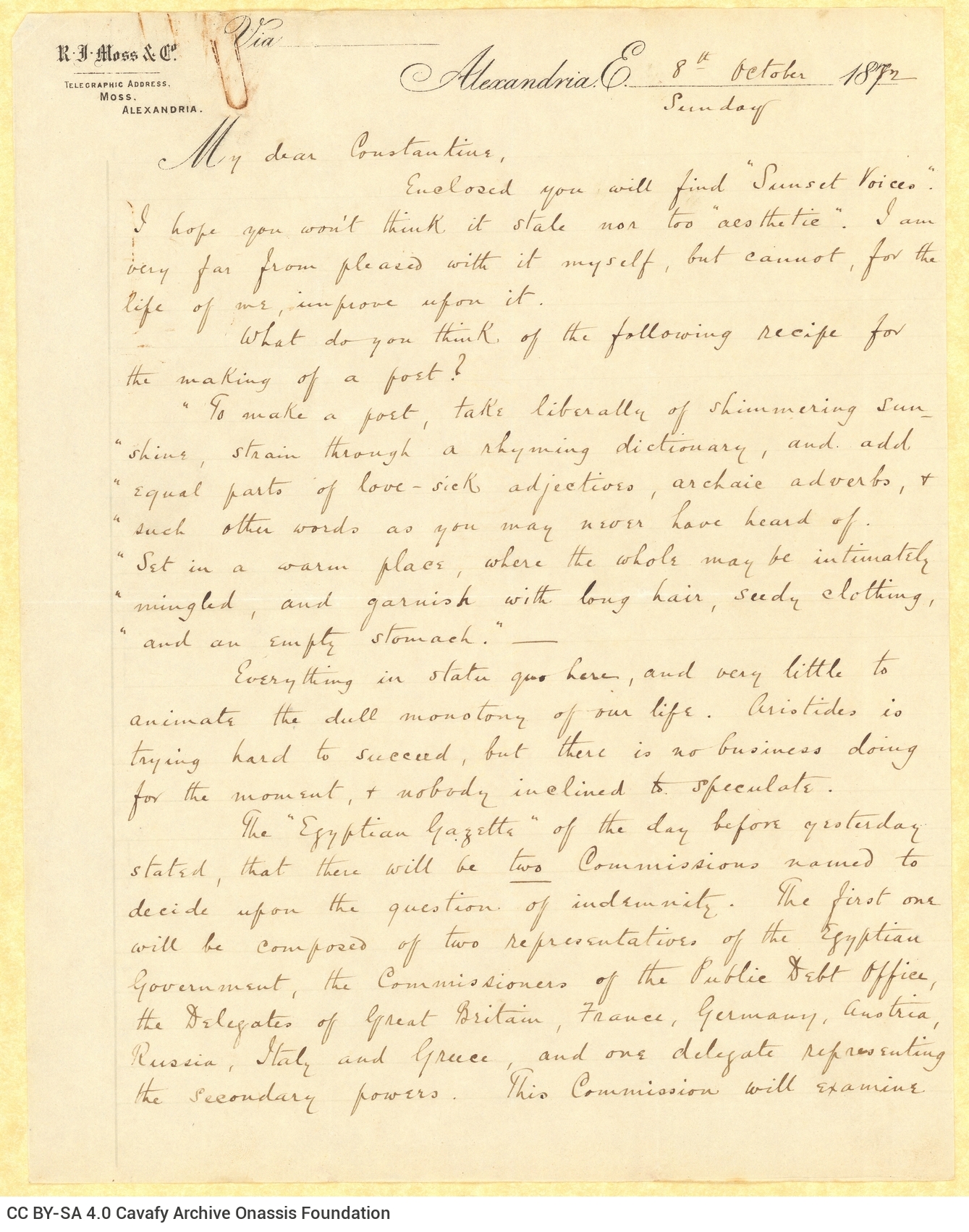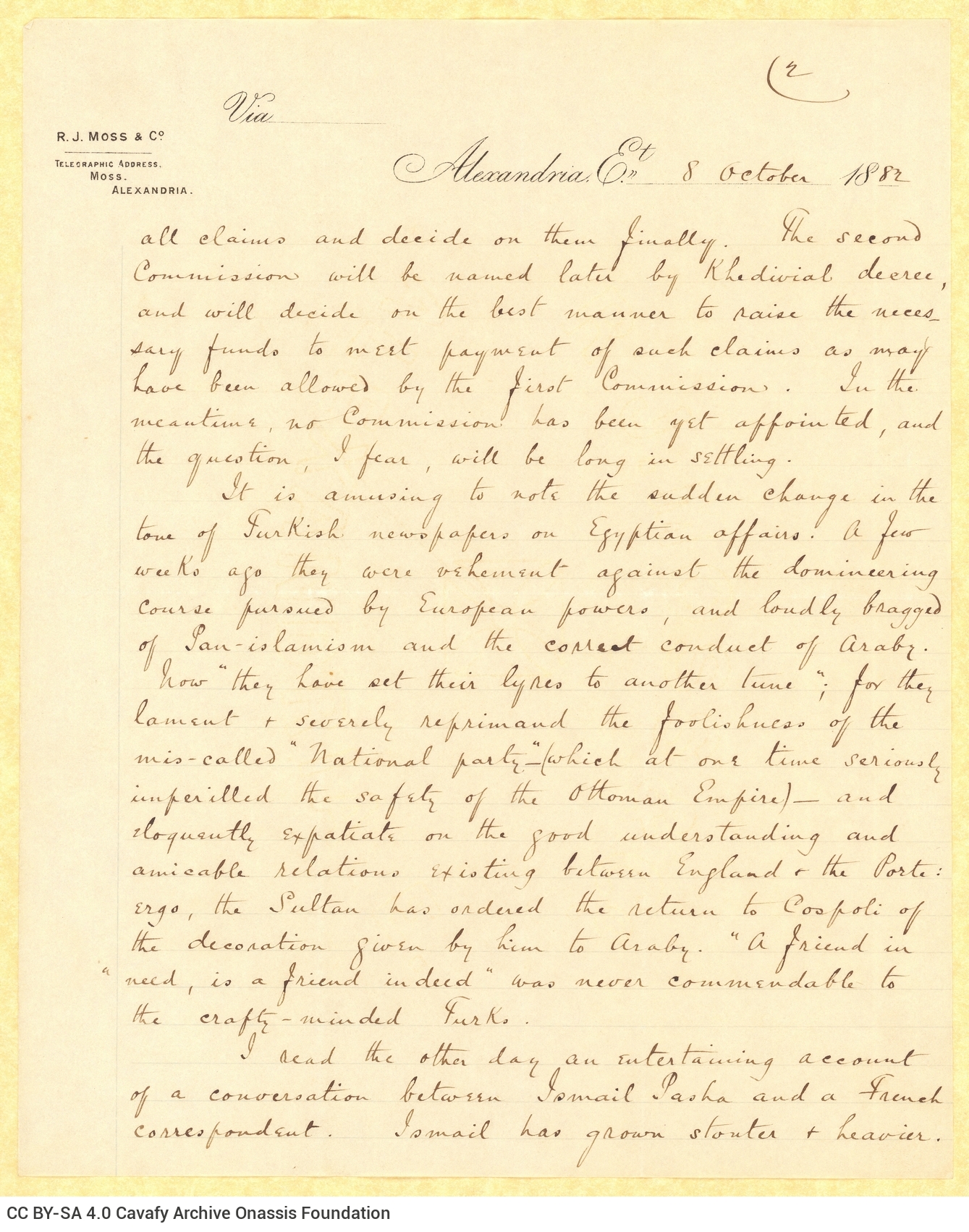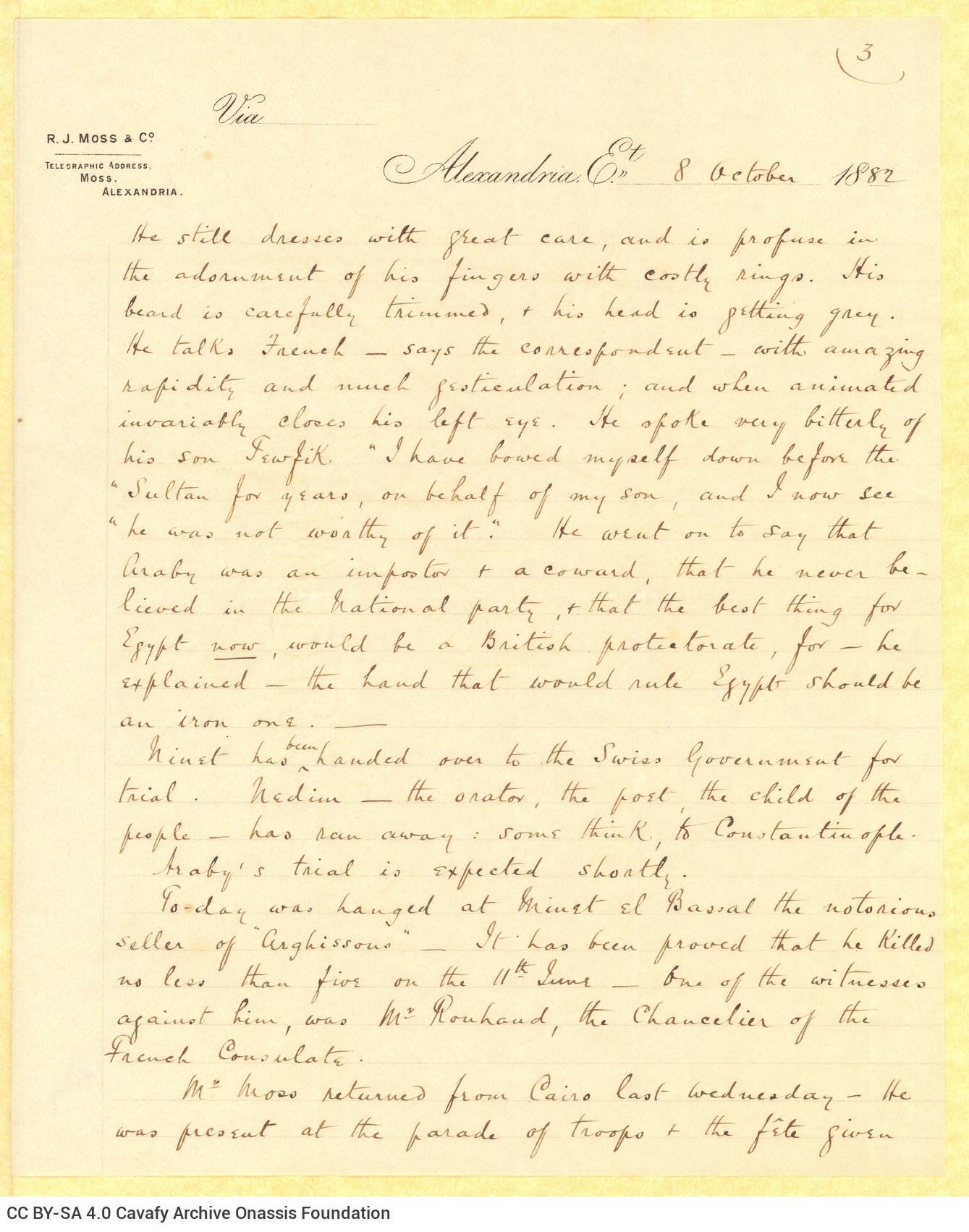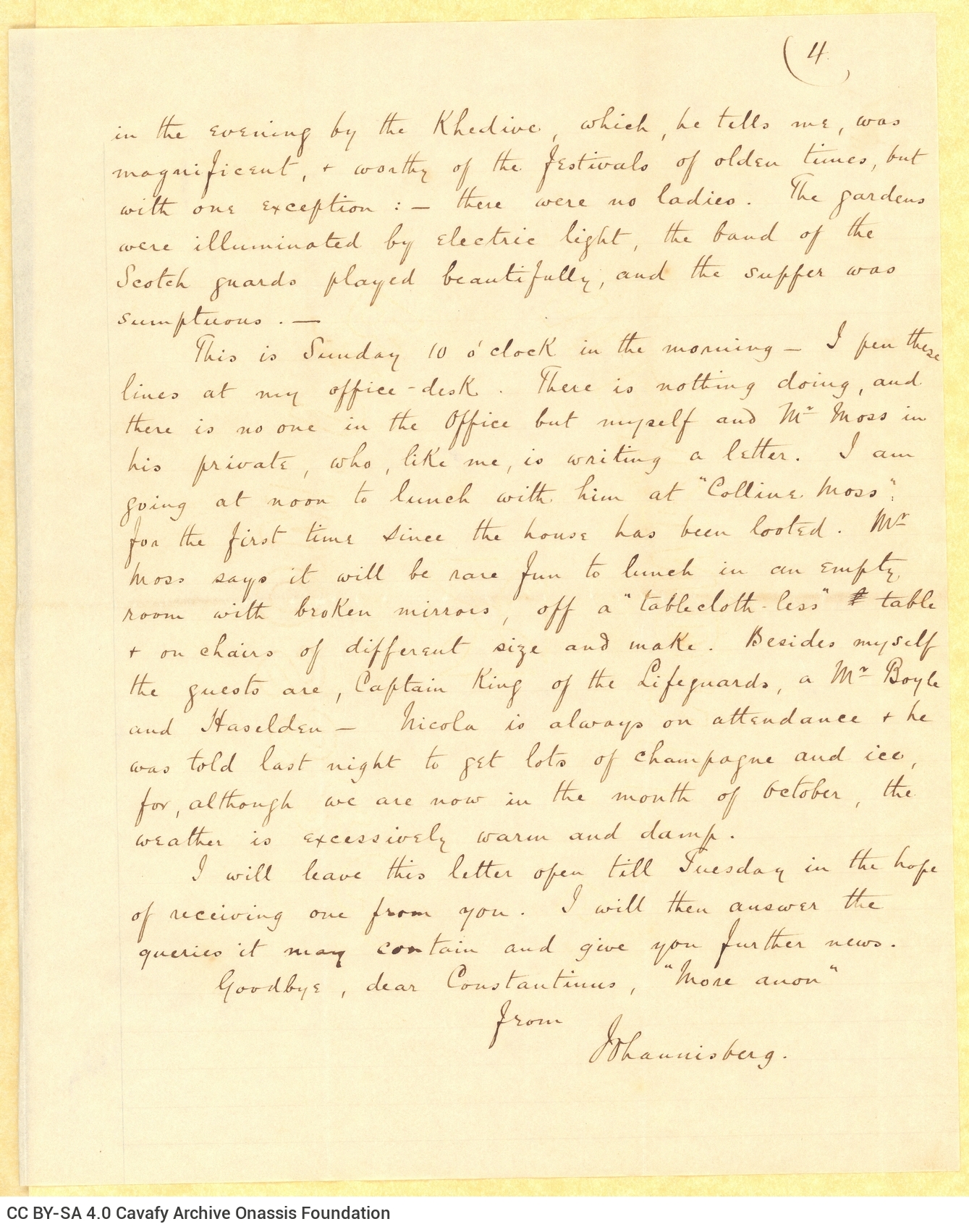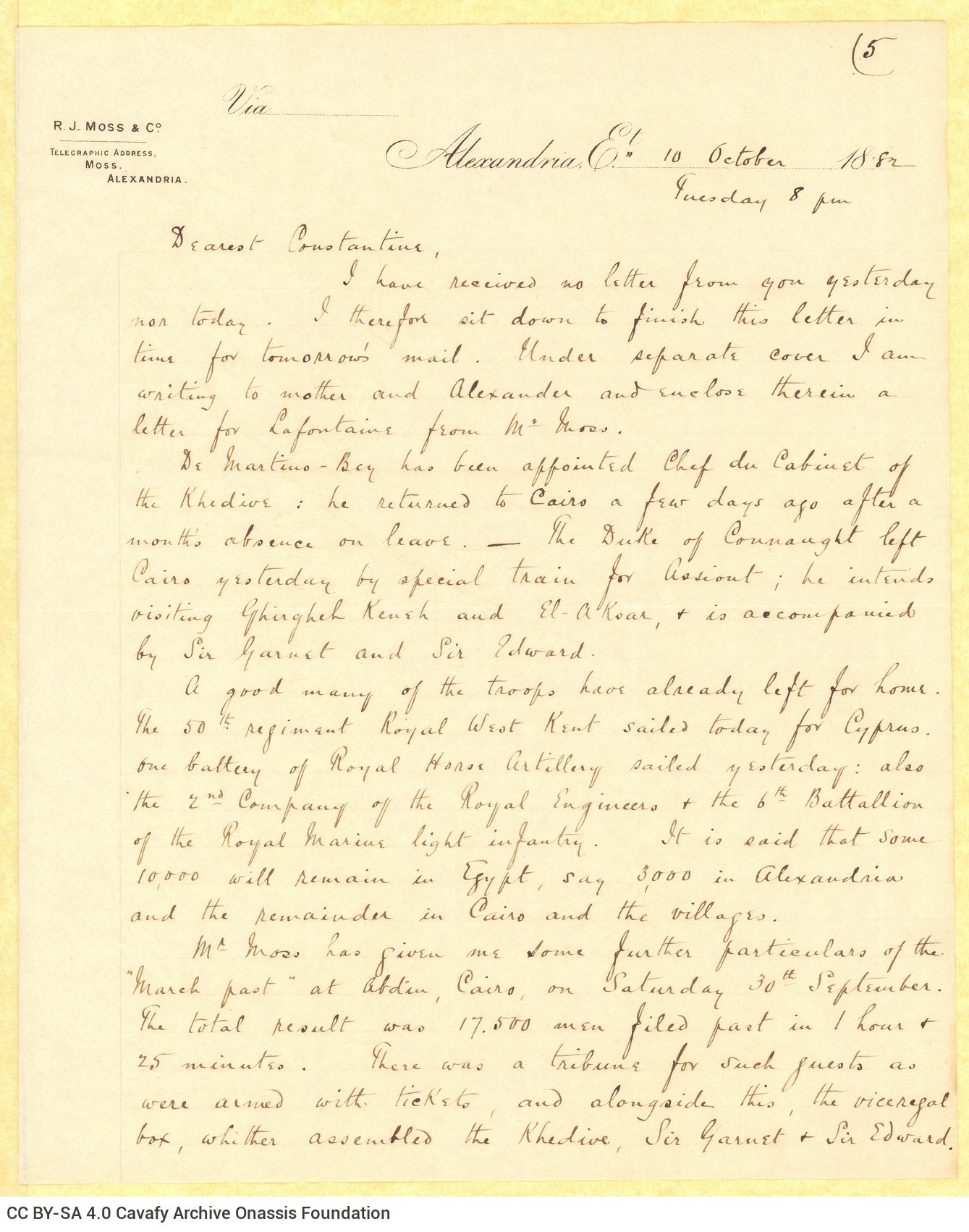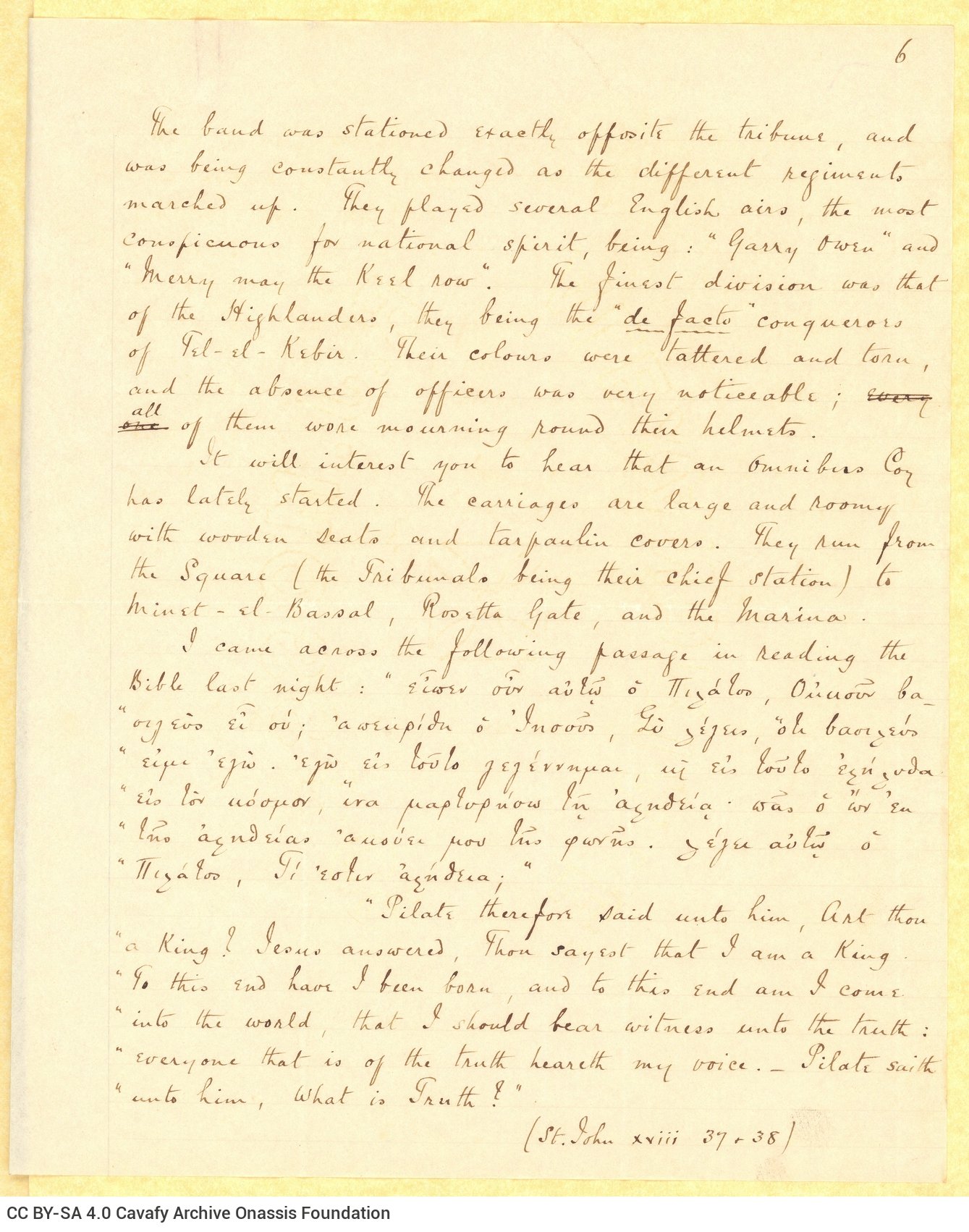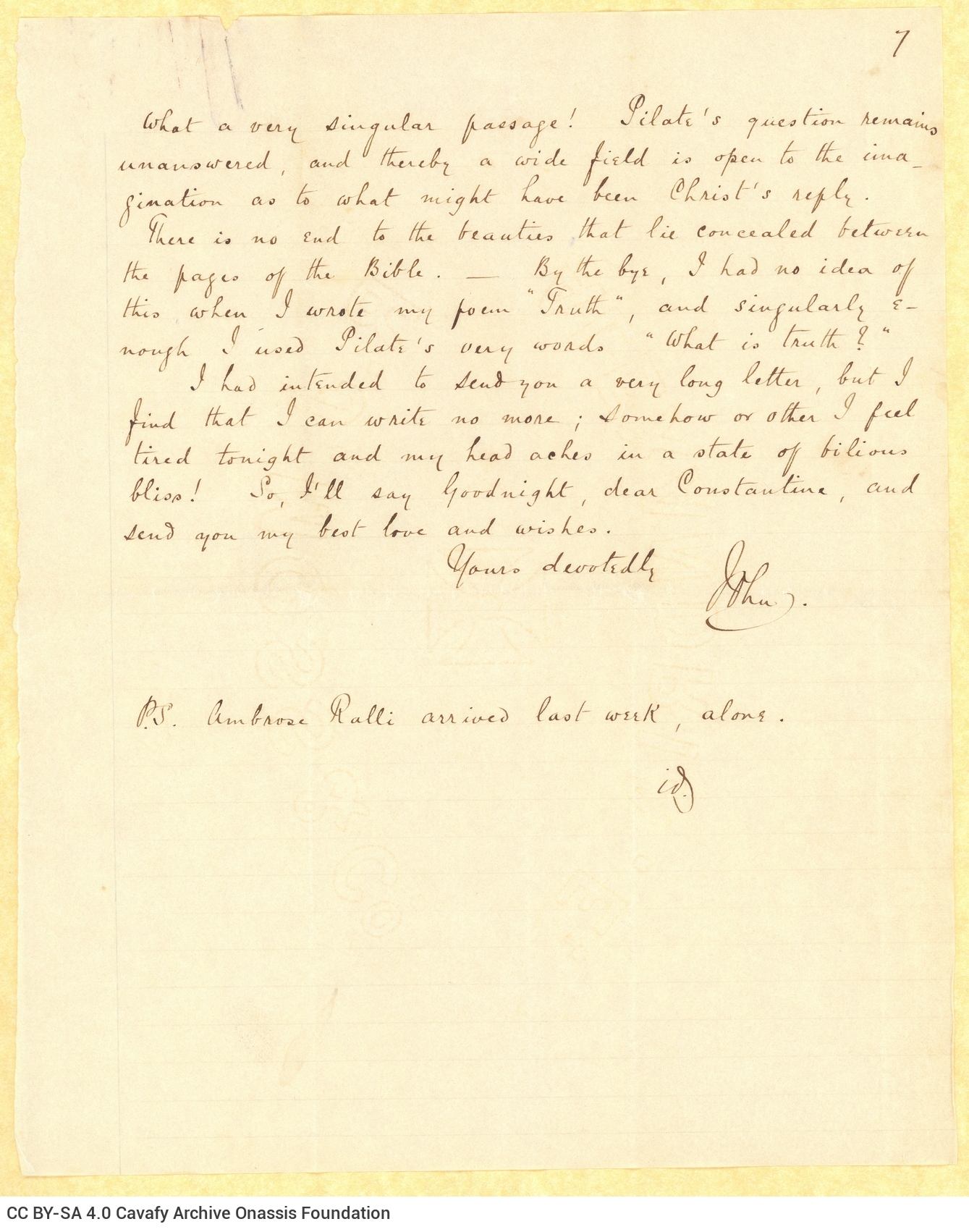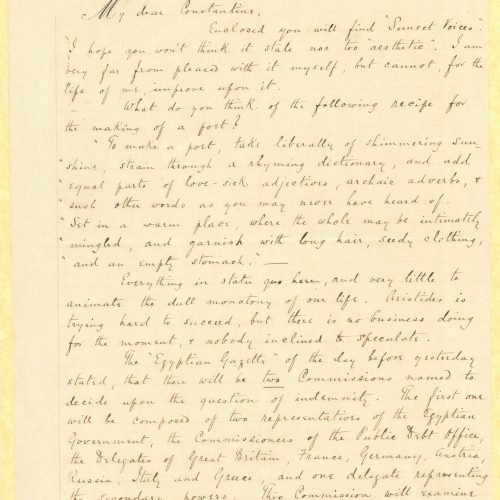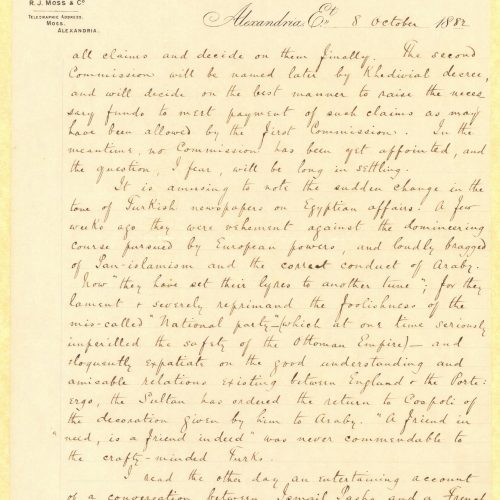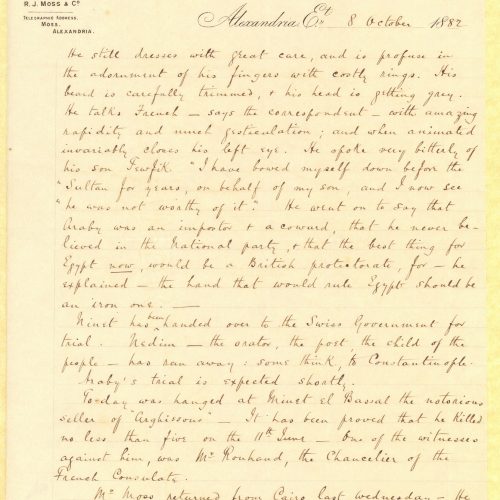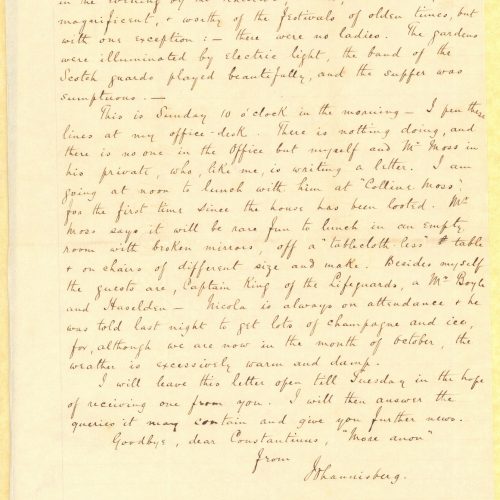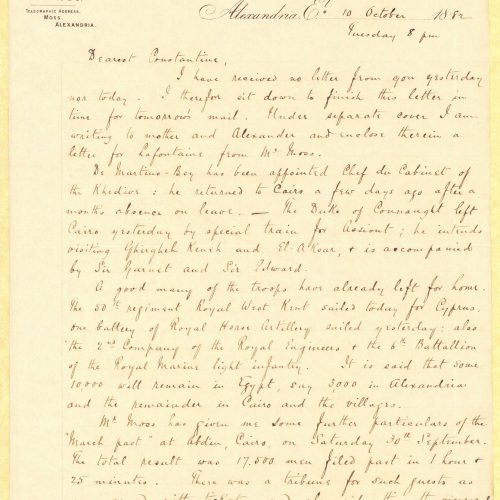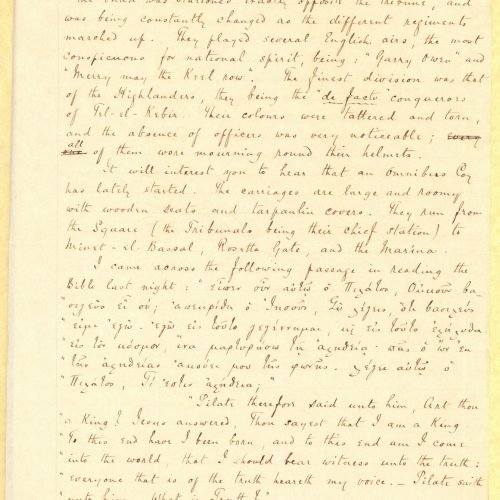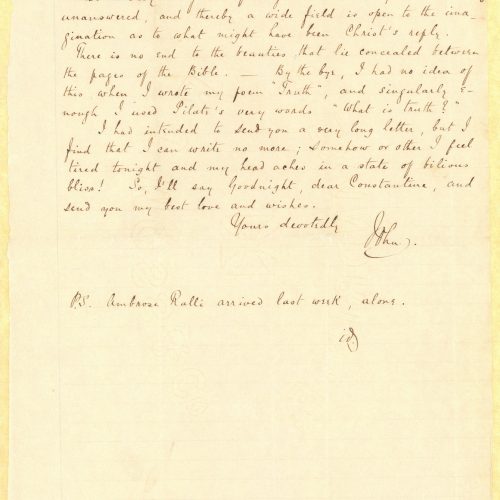Letter by John Cavafy to C. P. Cavafy
[Alexandria] 8th October 1882
SundayMy dear Constantine,
Enclosed you will find “Sunset Voices”. I hope you won’t think it stale nor too “aesthetic”. I am very far from pleased with it myself, but cannot, for the life of me, improve upon it.
What do you think of the following recipe for the making of a poet?
“To make a poet, take liberally of shimmering sunshine, strain through a rhyming dictionary, and add equal parts of love-sick adjectives, archaic adverbs, and such other words as you may never have heard of. Set in a warm place, where the whole may be intimately mingled, and garnish with long hair, seedy clothing, and an empty stomach.” ―
Everything in statu quo here, and very little to animate the dull monotony of our life. Aristides is trying hard to succeed, but there is no business doing for the moment, and nobody inclined to speculate.
The Egyptian Gazette of the day before yesterday stated, that there will be two Commissions named to decide upon the question of indemnity. The first one will be composed of two representatives of the Egyptian Government, the Commissioners of the Public Debt Office, the Delegates of Great Britain, France, Germany, Austria, Russia, Italy and Greece, and one delegate representing the secondary powers. This Commission will examineall claims and decide on them finally. The second Commission will be named later by Khedivial decree, and will decide on the best manner to raise the necessary funds to meet payment of such claims as may have been allowed by the first Commission. In the meantime, no Commission has been yet appointed, and the question, I fear, will be long in settling.
It is amusing to note the sudden change in the tone of Turkish newspapers on Egyptian affairs. A few weeks ago they were vehement against the domineering course pursued by European powers, and loudly bragged of Pan-islamism and the correct conduct of Araby.
Now “they have set their lyres to another tune”; for they lament and severely reprimand the foolishness of the mis-called “National party” ― (which at one time seriously imperilled the safety of the Ottoman Empire) ― and eloquently expatiate on the good understanding and amicable relations existing between England and the Porte: ergo, the Sultan has ordered the return to Constantinopoli of the decoration given by him to Araby. “A friend in need, is a friend indeed” was never commendable to the crafty-minded Turks.
I read the other day an entertaining account of a conversation between Ismail Pasha and a French correspondent. Ismail has grown stouter and heavier.He still dresses with great care, and is profuse in the adornment of his fingers with costly rings. His beard is carefully trimmed, and his head is getting grey. He talks French ― says the correspondent ― with amazing rapidity and much gesticulation; and when animated invariably closes his left eye. He spoke very bitterly of his son Tewfik. “I have bowed myself down before the Sultan for years, on behalf of my son, and I now see he was not worthy of it.” He went on to say that Araby was an impostor and a coward, that he never believed in the National party, and that the best thing for Egypt now, would be a British protectorate, for ― he explained ― the hand that would rule Egypt should be an iron one. ―
Ninet has been handed over to the Swiss Government for trial. Nedim ― the orator, the poet, the child of the people ― has ran away: some think, to Constantinople.
Araby’s trial is expected shortly.
To-day was hanged at Minet el Bassal the notorious seller of “Arghissous” ― It has been proved that he killed no less than five on the 11th June ― One of the witnesses against him, was Mr. Rouhaud, the Chancelier of the French Consulate.
Mr. Moss returned from Cairo last Wednesday ― He was present at the parade of troops and the fête givenin the evening by the Khedive, which, he tells me, was magnificent, and worthy of the festivals of older times, but with one exception: ― there were no ladies. The gardens were illuminated by electric light, the band of the Scotch guards played beautifully, and the supper was sumptuous. ―
This is Sunday 10 o’clock in the morning ― I pen these lines at my office-desk. There is nothing doing, and there is no one in the Office but myself and Mr. Moss in his private, who, like me, is writing a letter. I am going at noon to lunch with him at “Colline Moss” for the first time since the house has been looted. Mr. Moss says it will be rare fun to lunch in an empty room with broken mirrors, off a “tablecloth-less” table and on chairs of different size and make. Besides myself the guests are, Captain King of the Lifeguards, a Mr. Boyle and Haselden ― Nicola is always on attendance and he was told last night to get lots of champagne and ice, for, although we are now in the month of October, the weather is excessively warm and damp.
I will leave this letter open till Tuesday in the hope of receiving one from you. I will then answer the queries it may contain and give you further news.
Goodbye, dear Constantinus, “More anon”
From
Johannisberg.10 October 1882
Tuesday 8 pmDearest Constantine,
I have received no letter from you yesterday nor today. I therefore sit down to finish this letter in time for tomorrow’s mail. Under separate cover I am writing to mother and Alexander and enclose therein a letter for Lafontaine from Mr. Moss.
De Martino-Bey has been appointed Chef du Cabinet of the Khedive: he returned to Cairo a few days ago after a month’s absence on leave. ― The Duke of Connaught left Cairo yesterday by special train for Assiout; he intends visiting Ghirgheh Keneh and El-Aksar, and is accompanied by Sir Garnet and Sir Edward.
A good many of the troops have already left for home. The 50th regiment Royal West Kent sailed today for Cyprus. One battery of Royal Horse Artillery sailed yesterday: also the 2nd Company of the Royal Engineers and the 6th Battallion of the Royal Marine light infantry. It is said that some 10,000 will remain in Egypt, say 3,000 in Alexandria and the remainder in Cairo and the villages.
Mr. Moss has given me some further particulars of the “March past” at Abdin, Cairo, on Saturday 30th September. The total result was 17,500 men filed past in 1 hour and 25 minutes. There was a tribune for such guests as were armed with tickets, and alongside this, the viceregal box, whither assembled the Khedive, Sir Garnet and Sir Edward.The band was stationed exactly opposite the tribune, and was being constantly changed as the different regiments marched up. They played several English airs, the most conspicuous for national spirit, being: “Garry Owen” and “Merry may the Keel now”. The finest division was that of the Highlanders, they being the de facto conquerors of Tel-el-Kebir. Their colours were tattered and torn, and the absence of officers was very noticeable; all of them wore mourning round their helmets.
It will interest you to hear that an Omnibus Company has lately started. The carriages are large and roomy with wooden seats and tarpaulin covers. They run from the Square (the Tribunals being their chief station) to Minet-el-Bassal, Rosetta Gate, and the Marina.
I came across the following passage in reading the Bible last night: “είπεν ουν αυτώ ο Πιλάτος, Oυκούν βασιλεύς ει συ; απεκρίθη ο Iησούς, Συ λέγεις, ότι βασιλεύς ειμι εγώ. εγώ εις τούτο γεγέννημαι, και εις τούτο ελήλυθα εις τον κόσμον, ίνα μαρτυρήσω τη αληθεία· πας ο ων εκ της αληθείας ακούει μου της φωνής. λέγει αυτώ ο Πιλάτος, Tί εστιν αλήθεια;”
“Pilate therefore said unto him, Art thou a King? Jesus answered, Thou sayest that I am a King. To this end have I been born, and to this end am I come into the world, that I should bear witness unto the truth: everyone that is of the truth heareth my voice. ― Pilate saith unto him, What is Truth?”
(St. John xviii 37+38)What a very singular passage! Pilate’s question remains unanswered, and thereby a wide field is open to the imagination as to what might have been Christ’s reply.
There is no end to the beauties that lie concealed between the pages of the Bible. ― By the bye, I had no idea of this when I wrote my poem “Truth”, and singularly enough I used Pilate’s very words “What is truth?”
I had intended to send you a very long letter, but I find that I can write no more; somehow or other I feel tired tonight and my head aches in a state of bilious bliss! So, I’ll say Goodnight, dear Constantine, and send you my best love and wishes.
Yours devotedly
JohnP.S. Ambrose Ralli arrived last week, alone.
id.
DIGITAL OBJECT DESCRIPTION
IDENTITY AREA
43.5 x 27 cm
CONTEXT AREA
CONTENT AND STRUCTURE AREA
Handwritten letter by John Cavafy to C. P. Cavafy on three sheets and two double sheet notepapers of R. J. Moss & Co., Alexandria. Pages 2-7 are numbered at top right. Detailed update on the political situation in Egypt and the role of the English military forces and politicians. Brief quote in Greek from the Gospel of John.
CONDITIONS OF ACCESS AND USE AREA
Mainly English
Writing in ink. Watermark: R. J. Moss & Co Alexandria. Physical item wear: oxidations.
NOTES AREA
The transcription and editing of the letters of John Constantine Cavafy addressed to C. P. Cavafy was first carried out by Katerina Ghika; said transcriptions were subsequently uploaded to the official website of the Cavafy Archive.
John Cavafy encloses his poem “Sunset Voices”.
